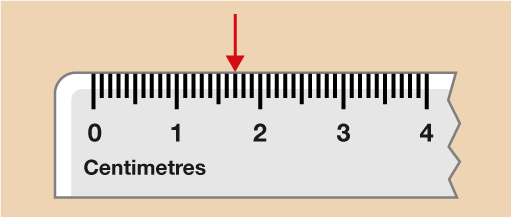1.3 Measuring in millimetres and centimetres
When you’re measuring an item, you need to decide whether to measure it in millimetres, centimetres or metres. Often, your decision will be based on the size of the item, why you are measuring it and how accurate you need the measurement to be.
When you measure an item, you can actually express the same measurement in different ways. To help you to do this, you need to know some metric measure facts:
Facts
10 millimetres = 1 centimetre
100 centimetres = 1 metre
1 000 metres = 1 kilometre
Starting with the smallest, metric units of length are millimetres (mm), centimetres (cm) and metres (m).
Kilometres (km) are used to measure distance.
Example: Writing measurements in millimetres and centimetres
You can express a measurement in millimetres, centimetres or a combination of both. Look at the ruler below. What measurement is the arrow pointing to?
Method
The numbers displayed on the ruler represent centimetres. Each line in between each whole centimetre is a millimetre; ten millimetres is equal to one centimetre. So you can say that the arrow is pointing to:
1 cm 7 mm
However, you could write it all in centimetres. The length is one whole centimetre plus seven additional millimetres, so you would write:
1.7 cm
Note how the decimal point separates the number of centimetres from the number of millimetres. Alternatively you could write this measurement in millimetres. One centimetre equals ten millimetres, so:
1 cm 7 mm = 10 mm + 7 mm = 17 mm
Now try the following activity.
Activity 4: Writing measurements in different ways
Complete the gaps in the table to show the same measurement written in three different ways. The first one has been done for you. Remember to check your answers.
| Centimetres and millimetres | Centimetres | Millimetres |
|---|---|---|
| 1 cm 7 mm | 1.7 cm | 17 mm |
| 8 cm 9 mm | ||
| 9.4 cm | ||
| 63 mm | ||
| 12 cm 6 mm | ||
| 105 mm | ||
| 20.1 cm |
Answer
| Centimetres and millimetres | Centimetres | Millimetres |
|---|---|---|
| 1 cm 7 mm | 1.7 cm | 17 mm |
| 8 cm 9 mm | 8.9 cm | 89 mm |
| 9 cm 4 mm | 9.4 cm | 94 mm |
| 6 cm 3 mm | 6.3 cm | 63 mm |
| 12 cm 6 mm | 12.6 cm | 126 mm |
| 10 cm 5 mm | 10.5 cm | 105 mm |
| 20 cm 1 mm | 20.1 cm | 201 mm |

